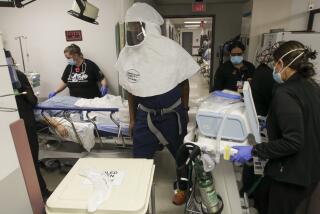Health Workers Resist Taking AIDS Tests
- Share via
ATLANTA — Representatives of a broad range of groups Thursday emphatically urged the federal Centers for Disease Control to reject mandatory AIDS testing of health care workers, calling the idea unfair, unworkable and too expensive.
At a two-day meeting, which continues today, the CDC is listening to views of doctors, nurses, legal experts, state and city officials and others as part of its effort to set guidelines to reduce the chances that health care workers will infect patients.
The issue has become increasingly controversial since the CDC announced last summer that a Florida dentist apparently infected one of his patients with the deadly human immunodeficiency virus. Since the initial report, two other infected patients have been discovered.
Nevertheless, speaker after speaker told CDC officials during the hearing at a downtown hotel that the danger of infecting patients was “infinitesimal” and that the risk can best be addressed through improved infection control procedures.
The CDC, in a draft report compiled after the Florida cases were discovered, estimated that the chance of a surgeon’s infecting a patient ranged somewhere between 1 in 42,000 to 1 in 417,000. It said the risk to a dental patient during a procedure likely to cause bleeding ranged from 1 in 263,000 to 1 in 2.6 million.
The wide swings take into account variables such as whether solid or hollow suture needles are used. Hollow needles are presumed to more easily transmit contaminated blood.
C. William Keck of the American Public Health Assn., citing what he called the “extremely small” risk to patients, warned that testing large numbers of health care providers could result in numerous “false positive” readings and drive many doctors and dentists out of the professions.
Several other speakers agreed that health care delivery would be greatly diminished nationwide, especially for people with AIDS.
Michael Merdian of the National Assn. of People With AIDS said testing health care workers would lead to mandatory testing of all people seeking medical care and “stimulate fear and panic among Americans.”
Other groups opposing mandatory testing included the American Hospital Assn., AIDS Action Council, Assn. of State and Territorial Health Officials, American Assn. of Occupational Health Nurses, the American Civil Liberties Union Foundation and the American Federation of State, County and Municipal Employees.
Among objections were the expense involved in testing, violation of privacy and the frequent testing that would be required to ensure that results remain current. Several participants wondered whether tests for alcohol abuse, depression and other ailments might ensue.
The American Medical Assn. and the American Dental Assn. also opposed mandatory testing; but they reiterated their controversial policy of calling on doctors and dentists infected with HIV to voluntarily refrain from surgical procedures or inform patients of their conditions.
Opposition to mandatory testing was not unanimous, however.
Dr. Sanford Kuvin of the National Foundation for Infectious Diseases said that the AMA and ADA positions do not go far enough.
“Failed volunteerism is exactly what caused those three patients to be infected in Florida,” he said, urging that all health care professionals “involved in invasive procedures should have mandatory testing” for HIV and hepatitis “and make their status known to their patients.”
Kuvin went on to say that “blood is a two-way street” and that patients should be similarly tested.
As he ended his alloted five minutes of remarks, Kuvin was greeted with barely audible applause and some scattered boos.
The divergence of views and the passion surrounding them illustrate the difficulty confronting the CDC as it ponders its position on the issue.
Current guidelines merely say that whether HIV-infected health care workers may safely perform invasive procedures “must be determined on an individual basis.”
More to Read
Sign up for Essential California
The most important California stories and recommendations in your inbox every morning.
You may occasionally receive promotional content from the Los Angeles Times.










